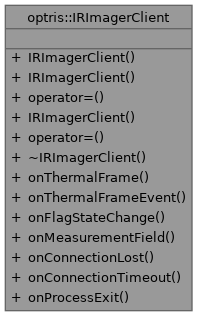 |
Thermal Camera SDK 10.0.1
SDK for Optris Thermal Cameras
|
 |
Thermal Camera SDK 10.0.1
SDK for Optris Thermal Cameras
|
Base class for clients observing an IRImager. More...
#include <IRImagerClient.h>

Public Member Functions | |
| IRImagerClient ()=default | |
| Constructor. | |
| IRImagerClient (const IRImagerClient &)=default | |
| No copy constructor. | |
| IRImagerClient & | operator= (const IRImagerClient &)=default |
| No copy assignment. | |
| IRImagerClient (IRImagerClient &&)=default | |
| Move constructor. | |
| IRImagerClient & | operator= (IRImagerClient &&)=default |
| Move assignment. | |
| virtual | ~IRImagerClient ()=default |
| Destructor. | |
| virtual void | onThermalFrame (const ThermalFrame &thermal, const FrameMetadata &meta) |
| Callback method for thermal frames. | |
| virtual void | onThermalFrameEvent (const ThermalFrame &thermal, const Frame &energy, const FrameMetadata &meta, const std::vector< SnapshotEvent > &events) |
| Callback method for thermal frames triggered with a raising edge event on PIF digital input or software trigger. | |
| virtual void | onFlagStateChange (FlagState flagState) |
| Callback method for flag state events. The method is called when the flag state changes. | |
| virtual void | onMeasurementField (const MeasurementField &field) |
| Callback method for measurement fields. The method is called when the calculation has finished. | |
| virtual void | onConnectionLost () |
| Called when a connection loss is detected. | |
| virtual void | onConnectionTimeout () |
| Called when a connection timeout is detected. | |
| virtual void | onProcessExit () |
| Callback method for synchronizing data. This is the very last method to be called for each raw data set. | |
Base class for clients observing an IRImager.
The architecture is following the Observer design pattern. To receive data like thermal frames from your device derive your own class from it and implement the callback methods. After creating an instance of you need to register it with an IRImager object by calling its IRImager::addClient() method.
|
inlinevirtual |
Called when a connection loss is detected.
A connection loss can not be recovered. This happens, for example, if the USB connection is interrupted by pulling the plug.
It is up to the client to call IRImager:disconnect(). This gives the client the ability to ensure a graceful disconnect on its end.
|
inlinevirtual |
Called when a connection timeout is detected.
Unlike with connection losses you may recover from a timeout.
Connection timeouts are the only way to detect connection losses with Ethernet devices. This is due to the fact that these devices continuously send UDP packages once they are powered. Besides receiving these packages the SDK has no way of knowing whether the connection is lost.
It is up to the client to call IRImager:disconnect(). This gives the client the ability to ensure a graceful disconnect on its end.
|
inlinevirtual |
Callback method for flag state events. The method is called when the flag state changes.
| [in] | flagState | current flag state. |
|
inlinevirtual |
Callback method for measurement fields. The method is called when the calculation has finished.
The provided reference will remain valid outside the callback but the data that it is pointing to will be overwritten. Make a copy (C++) or use the clone() method (other languages) if you want to use it outside of the callback.
The reference is const. Thus, you have only read access to the object it is referring to. Attempts to manipulate its content will cause issues.
| [in] | field | measurement field. |
|
inlinevirtual |
Callback method for thermal frames.
The provided references will remain valid outside the callback but the data that they are pointing to will be overwritten. Make a copy (C++) or use the clone() method (other languages) if you want to use them outside of
the callback.
The references are const. Thus, you have only read access to the objects they are referring to. Attempts to manipulate their content will cause issues.
This callback will also be triggered during the initial startup calibration phase following a successful device connection. During this time the thermal data is unreliable. You can detect this phase by checking whether the flag state stored in the meta data (FrameMetadata::getFlagState()) is set to Initializing.
| [in] | thermal | frame. |
| [in] | meta | additional meta data. |
|
inlinevirtual |
Callback method for thermal frames triggered with a raising edge event on PIF digital input or software trigger.
The provided references will remain valid outside the callback but the data that they are pointing to will be overwritten. Make a copy (C++) or use the clone() method (other languages) if you want to use them outside of
the callback.
The references are const. Thus, you have only read access to the objects they are referring to. Attempts to manipulate their content will cause issues.
For future use.
| [in] | thermal | frame. |
| [in] | energy | frame. |
| [in] | meta | additional meta data for both frames. |
| [in] | events | snapshot events. |